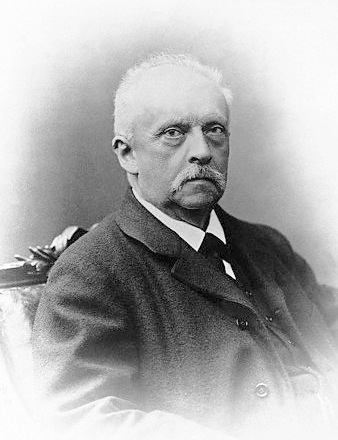Hermann von Helmholtz
 Hermann Ludwig Ferdinand von Helmholtz}} (31 August 1821 – 8 September 1894) was a German physicist and physician who made significant contributions in several scientific fields, particularly hydrodynamic stability. The Helmholtz Association, the largest German association of research institutions, is named in his honour.
Hermann Ludwig Ferdinand von Helmholtz}} (31 August 1821 – 8 September 1894) was a German physicist and physician who made significant contributions in several scientific fields, particularly hydrodynamic stability. The Helmholtz Association, the largest German association of research institutions, is named in his honour.In the fields of physiology and psychology, Helmholtz is known for his mathematics concerning the eye, theories of vision, ideas on the visual perception of space, colour vision research, the sensation of tone, perceptions of sound, and empiricism in the physiology of perception. In physics, he is known for his theories on the conservation of energy and on the electrical double layer, work in electrodynamics, chemical thermodynamics, and on a mechanical foundation of thermodynamics. As a philosopher, he is known for his philosophy of science, ideas on the relation between the laws of perception and the laws of nature, the science of aesthetics, and ideas on the civilizing power of science. Provided by Wikipedia
Showing 1 - 20 results of 34 for search 'Helmholtz, Hermann von, 1821-1894', query time: 0.36s
Refine Results
-
1by Helmholtz, Hermann von, 1821-1894
Published 1895Call Number: Loading...
Located:Loading...Book Loading... -
2by Helmholtz, Hermann von, 1821-1894
Published 1971Call Number: Loading...
Located:Loading...Book Loading... -
3by Helmholtz, Hermann von, 1821-1894
Published 1962Call Number: Loading...
Located:Loading...Book Loading... -
4by Helmholtz, Hermann von, 1821-1894
Published 1904Call Number: Loading...
Located:Loading...Book Loading... -
5by Helmholtz, Hermann von, 1821-1894
Published 1962Call Number: Loading...
Located:Loading...Book Loading... -
6by Helmholtz, Hermann von, 1821-1894
Published 1968Call Number: Loading...
Located:Loading...Book Loading... -
7by Helmholtz, Hermann von, 1821-1894
Published 1917Call Number: Loading...
Located:Loading...Book Loading... -
8by Helmholtz, Hermann von, 1821-1894
Published 1924Call Number: Loading...
Located:Loading...Book Loading... -
9by Helmholtz, Hermann von, 1821-1894
Published 1977Call Number: Loading...
Located:Loading...Book Loading... -
10by Helmholtz, Hermann von, 1821-1894
Published 1924Call Number: Loading...
Located:Loading...Book Loading... -
11by Helmholtz, Hermann von, 1821-1894
Published 1896Call Number: Loading...
Located:Loading...Book Loading... -
12by Helmholtz, Hermann von, 1821-1894
Published 1954Call Number: Loading...
Located:Loading...Book Loading... -
13by Helmholtz, Hermann von, 1821-1894
Published 1983Call Number: Loading...
Located:Loading...Book Loading... -
14by Helmholtz, Hermann von, 1821-1894
Published 1847Call Number: Loading...
Located:Loading...Microform Book Loading... -
15by Helmholtz, Hermann von, 1821-1894
Published 1882Call Number: Loading...
Located:Loading...Microform Book Loading... -
16by Helmholtz, Hermann von, 1821-1894
Published 1863Call Number: Loading...
Located:Loading...Microform Book Loading... -
17by Helmholtz, Hermann von, 1821-1894
Published 1867Call Number: Loading...
Located:Loading...Microform Book Loading... -
18by Helmholtz, Hermann von, 1821-1894
Published 1897Call Number: Loading...
Located:Loading...Microform Book Loading... -
19by Helmholtz, Hermann von, 1821-1894
Published 1873Call Number: Loading...
Located:Loading...Microform Book Loading... -
20by Helmholtz, Hermann von, 1821-1894
Published 1875Call Number: Loading...
Located:Loading...Microform Book Loading...
Search Tools:
RSS Feed
–
Email Search
Related Subjects
Science
Acoustics and physics
Force and energy
Music
Physiological aspects
Physiological optics
Sound
Knowledge
Philosophy
Physics
Acoustics
Auditory perception
Axioms
Combustion
Electrodynamics
Electromotive force
Foundations
Geometry
German language
Hearing
History
Inverse problems (Differential equations)
Knowledge, Theory of
Mathematics
Mechanics, Analytic
Medical physics
Organ pipes
Physiological effect
Physiology
Social aspects